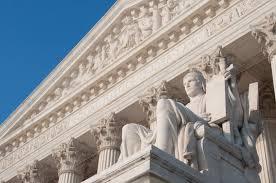Last Wednesday's Supreme Court ruling in McCutcheon v. FEC should alarm and outrage everyone in our democracy, especially Americans committed to faith traditions rooted in the Hebrew Scriptures.
The Court's majority, led by Chief Justice John Roberts, struck down limits on individual contributions to candidates and political committees. In his ruling, Roberts argued:
Spending large sums of money in connection with elections, but not in connection with an effort to control the exercise of an officeholder's official duties, does not give rise to quid pro quo corruption. Nor does the possibility that an individual who spends large sums may garner "influence over or access to" elected officials or political parties.
From a purely legal perspective, Roberts may be right that large campaign contributions are not technically bribes, or "quid pro quo" arrangements. But even if he is correct about the law and its definition, from the perspective of the impact of large political contributions on politicians, political parties and the political system in general, the difference between extremely large donations and bribes is marginal.
Strictly speaking, a bribe is when an individual or a group of people gives a gift of money, or some other inducement, to an official so that the official will act in their favor. We rightly ban such transactions because they subvert justice and undermine the common good: We ideally want a society where policies and rules are instituted on their merits rather than on how well they have been bankrolled. Additionally, we ideally want a society where all enjoy equality under the law. When a person is allowed, effectively, to purchase a legislative or judicial outcome, it preferences their voice and will over those who are outbid. In such a system, where justice, or a desired political outcome, can be bought, the wealthy and the poor are no longer equal under the law.
More concerning is that a society that countenances bribery risks initiating a downward spiral: As the voice and will of the wealthiest few is prioritized over everyone else's, those without means become disillusioned and increasingly disengage from the political process. When average people detach from the system, the more it becomes controlled by the wealthy. Democracy transforms into an oligarchy, a government of, by, and for the wealthy and powerful.
The Bible was written in a world where such baksheesh was common, and where government belonged to the wealthy few at the expense of the poor majority. Authored by former slaves and generations of their descendants, those with a powerful memory of the injustices inherent in such a system, takes a strong and unequivocal stance against bribery. Exodus 23:8 warns, "A bribe blinds the clear-sighted and subverts the cause of those who are in the right." Deuteronomy 16:19 echoes the sentiment with nearly identical language. The Bible detests bribery as a perversion of justice, an indicator of a corrupt and morally broken society (Deut. 27:25).
But the Bible is not simply concerned with the act of bribery itself. Upon a careful read, one will find that it is primarily concerned with bribery's effects. A bribe distorts the perspective of the official who receives it and leads him or her to privilege the whims of the moneyed interest over the interests of justice and the public good. In other words, the Bible would ban any transaction that has the same effect as a bribe on officials and on society as a whole.
Large campaign contributions have precisely the same effect as bribes on politicians, political parties and the political system in general. Wealthy individuals volunteer sizable contributions to politicians only when they have a reasonable amount of confidence that those politicians will enact policies they champion. In turn, politicians and political parties shape their agendas and priorities around the interests of these large donors. The impact of this phenomenon on politics and on our society is the same as bribery's. To argue otherwise reflects either a profound naïveté or the total divorcement of law from real life. Our society has a powerful moral interest in limiting personal and corporate political contributions, if not banning them outright, for all the same reasons that we ban bribes.
To put it in, I think, appropriately stark terms, yesterday, the Supreme Court of the United States took another step that, especially when coupled with their 2010 decision in the case of Citizens United v. FEC, effectively legalizes bribery in our country.
People of faith who are animated by the Bible's vision of a just society, as well as those who are passionate about preserving, to borrow Lincoln's phrase, a government of, by, and for the people, regardless of their economic level, are right to be outraged by the McCutcheon decision.
Transforming indignation into meaningful change is now the task at hand. A long, hard battle it will likely be, but a crucial one. Money's distorting and corrosive effect on politics creates the underpinning for so many injustices and so much needless suffering. Extricating big money from our political system now may be the most significant moral issue of our time. But it is exactly what a God "who shows no favor and takes no bribe, who upholds the cause of the orphan and the widow, and who befriends the immigrant" (Deut. 10:18) would demand.

